CLOSE
Search
Types of Metal Bellow Mechanical Seal
In applications where the process temperature exceeds elastomer capabilities, metal bellows mechanical seals with graphite secondary seals are a good sealing option. Metal Bellows Single Seal is designed for high-temperature services typically found in chemical and petrochemical processes. Graphite secondary seals replace O-Rings to achieve the higher temperature requirements. Advanced bellows design distributes pressure uniformly across the span of the bellows plate to reduce stress and minimize weld fatigue. Component design replaces most OEM seals.
-
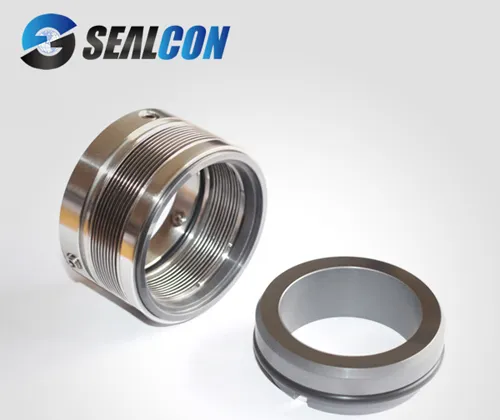 Metal Bellow Mechanical Seals M14M15M16Replacement for:
Metal Bellow Mechanical Seals M14M15M16Replacement for:
- John crane 670
- John crane 676
- John crane 680
Metal Bellow Mechanical Seals M14M15M16Replacement for:
- John crane 670
- John crane 676
- John crane 680
Features:
- High temperature
- Weld bellow
-
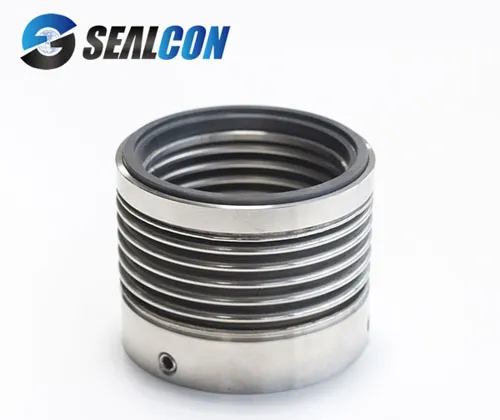 Metal Bellow Mechanical Seals M17Replacement for:
Metal Bellow Mechanical Seals M17Replacement for:
- John crane 515E
Metal Bellow Mechanical Seals M17Replacement for:
- John crane 515E
Features:
- High temperature
- Weld bellow
-
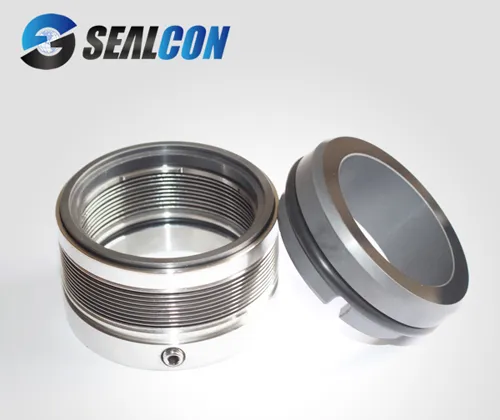 Metal Bellow Mechanical Seals M21Replacement for:
Metal Bellow Mechanical Seals M21Replacement for:
- Burgman MFL85N
Metal Bellow Mechanical Seals M21Replacement for:
- Burgman MFL85N
Features:
- High temperature
- Weld bellow
-
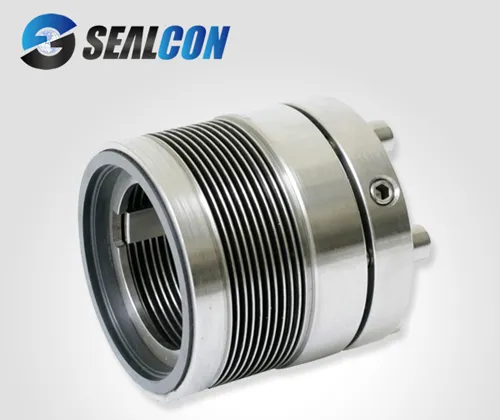 Metal Bellow Mechanical Seals M22Replacement for:
Metal Bellow Mechanical Seals M22Replacement for:
- Burgmann FMLWT80
Metal Bellow Mechanical Seals M22Replacement for:
- Burgmann FMLWT80
Features:
- High temperature
- Weld bellow
- Grafoil seals
Materials Combination for Bellows Mechanical Seal
- Face: Carbon, SiC, TC
- Seat: Ceramic, SiC, TC
- O-rings: NBR, EPDM, VITON, Aflas, FEP, Kalrez, Chemraz, Grofoil, etc.
- Spring: SS316, hastelloy C, AM350
- Metal parts: SS316, hastelloy C
Recommended Applications of Metal Bellow Seals
- Process industry
- Oil and gas industry
- Refining technology
- Petrochemical industry
- Chemical industry
- Hot media
- Cold media
- Highly viscous media
- Pumps
- Special rotating equipment
Features of Metal Bellow Mechanical Seals
- For unstepped shafts
- Single seal, balanced, independent of direction of rotation
- Metal bellows rotating
- Asymmetric bellows form results in even stress distribution with benefits of greater strength and higher rate of flexibilty; seal is bi-rotational and inherently pressure balanced.
- Smooth profile is resistant to clogging and therefore ideal for slurries and fibrous liquids. Similarly, seal unit is easy to clean and sterilize in place.
- Unit construction ensures a simple-to-fit seal, with superior heat dissipation paths. Seal unit is reliable and does not wear the shaft.
- Graphite secondary seals for high-temperature performance
- Advanced bellows design for maximum cycle life
- Rotary bellows for enhanced performance in slurry and particulate services
- Hydraulically-balanced seal design
- Blister-resistant carbon
- Proven heat-treated AM 350 bellows construction
- Graphite secondary seals for high-temperature performance
Advantages of Metal Bellow Mechanical Seals
- For extreme temperature ranges
- No dynamically loaded O-Ring
- Self-cleaning effect
- Short installation length possible
- Pumping screw for highly viscous media available (dependent on direction of rotation).
- For unstepped shafts
- Single seal, balanced
- Independent of direction of rotation
- Metal bellows rotating, rotating bellows, roller bellows
Common malfunction of metal bellow mechanical seals
- At high temperature, the bellows are easier to be broken, also the bellows are broken under high pressure (such as the hot water pump).
- It is easy to occur coking and carbon deposition at the trough between the wave plates, which makes the bellows lose elasticity and cannot compensate, so it can not be used for coking, carbon deposition and crystallized precipitation pump.
- For external installation mechanical seals, the sealing surface can be pushed open when the pressure in the sealing cavity is more than 0.2MPa. This is because the elastic force of the bellows is small and can not withstand the high pressure of the medium. Therefore, it is not possible to use an external bellows mechanical seal when the pressure is high.
-
Because the metal bellow type mechanical seal is a balanced structure, the effective diameter and load factor must be calculated in use. Otherwise, in the high-pressure propane and propane pump, the phenomenon of "spray leakage" is easy to occur.
Difference between Metal Bellow Seal and Ordinary Mechanical Seal
The welded metal bellows mechanical seal has good floating and random compensation, which can compensate for the leakage caused by wear, axial movement and vibration. Welded metal bellows itself as the elastic element and the sealing function, so there is no need to design the general dynamic auxiliary push ring spring type mechanical seal ring, thus avoiding the fine particles due to dynamic auxiliary seal ring caused by the obstruction, dynamic auxiliary seal and high temperature because of its axial friction resistance reduction the seal compensation ability of the problem.Metal bellows mechanical seal with no auxiliary seal ring, reduce a leak; at the same time reduce the friction resistance compensation mechanism, improve the following; in the petrochemical industry, welding sealing temperature is not restricted by auxiliary seal bellows; for PTFE bellows seal can be used in the corrosive medium. Its drawback is that some bellows have the smaller elastic force and need to add auxiliary springs.
Welded metal bellows are made by interlacing and closely welding each internal and external diameters of each wave plate, so no matter whether they are used as the stationary or rotary type, it is not necessary to consider the problem of rotation. Welded metal bellows can be made from precipitation hardening stainless steel, high-temperature nickel based materials and chrome-nickel corrosion resistant materials. Therefore, welded metal bellows can be applied to a wide range of temperature (-117 C - 426 C), and various acid, alkali and salt media. The selection of different thickness and layers of the wave plate makes it withstand a pressure of up to 7MPa in a special pump. The design of welded metal bellows seal is generally balanced, so its pressure bears little influence on the surface pressure. The welded metal bellows mechanical seal is not only suitable for nonhydrocarbon media, but also for flash hydrocarbon medium. Compared with the ordinary mechanical seal, its service life has been greatly improved, so it has a higher ratio of performance and price.

Get In Touch With SEALCON
Want the mechanical seals price list? Fill out the form and we'll get back to you ASAP.
From Our News
view all
-
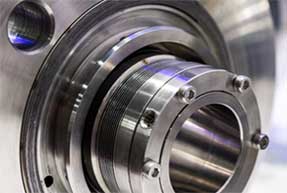 Apr 28 , 2024Motor Pump Spare Parts in Oil and Gas Exploration EquipmentThe Rigorous Demands of Oil and Gas ExplorationOil and gas exploration is a demanding and intricate process that relies on a plethora of equipment and machinery to extract valuable resources from bene...
Apr 28 , 2024Motor Pump Spare Parts in Oil and Gas Exploration EquipmentThe Rigorous Demands of Oil and Gas ExplorationOil and gas exploration is a demanding and intricate process that relies on a plethora of equipment and machinery to extract valuable resources from bene... -
 Apr 25 , 2024The Ultimate Guide to Motor Pump Spare Parts in Industrial ApplicationsIn industrial settings, motor pump spare parts are essential for maintaining the efficiency and longevity of machinery. Whether it's for a water pump, sewage pump, or any other type of industrial ...
Apr 25 , 2024The Ultimate Guide to Motor Pump Spare Parts in Industrial ApplicationsIn industrial settings, motor pump spare parts are essential for maintaining the efficiency and longevity of machinery. Whether it's for a water pump, sewage pump, or any other type of industrial ...
- Enhancing Efficiency in Water Treatment Plants with Gland Mechanical Parts
- Optimizing Performance in Turbomachinery with Gland Mechanical Parts
- The Essential Role of Double Seal Centrifugal Pumps in Oil and Gas Operations
- The Significance of Double Seal Centrifugal Pump in Pharmaceutical Manufacturing
- Double Seal Centrifugal Pumps in the Food and Beverage Industry
- Unlocking the Advantages and Benefits of PTFE Pump Seals
- How PTFE Pump Seals Contribute to Efficiency in Water Treatment Plants
- Carbon Ring Seals in Aggressive Fluid Handling
 English
English français
français Deutsch
Deutsch Español
Español italiano
italiano русский
русский português
português العربية
العربية ไทย
ไทย čeština
čeština Polska
Polska
